我可能是天津人 汉译英
- 格式:doc
- 大小:14.00 KB
- 文档页数:1
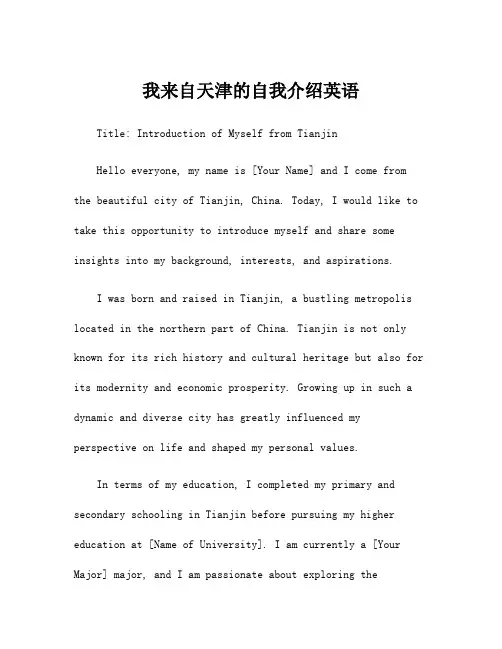
我来自天津的自我介绍英语Title: Introduction of Myself from TianjinHello everyone, my name is [Your Name] and I come from the beautiful city of Tianjin, China. Today, I would like to take this opportunity to introduce myself and share some insights into my background, interests, and aspirations.I was born and raised in Tianjin, a bustling metropolis located in the northern part of China. Tianjin is not only known for its rich history and cultural heritage but also for its modernity and economic prosperity. Growing up in such a dynamic and diverse city has greatly influenced my perspective on life and shaped my personal values.In terms of my education, I completed my primary and secondary schooling in Tianjin before pursuing my higher education at [Name of University]. I am currently a [Your Major] major, and I am passionate about exploring theintersections of [Your Field of Interest] and its impact on society. My academic journey has been a rewarding experience, as it has allowed me to develop critical thinking skills, cultivate a strong work ethic, and foster a deep appreciation for lifelong learning.Aside from academics, I have also been actively involved in various extracurricular activities and community service initiatives. I strongly believe in the importance of giving back to the community and making a positive difference in the lives of others. Through volunteering and engaging in social causes, I have had the opportunity to connect with people from diverse backgrounds and gain a deeper understanding of social issues.In terms of my interests and hobbies, I am an avid [Your Hobby], and I enjoy spending my free time [Your Hobby Activity]. I find [Your Hobby] to be a source of relaxation and personal fulfillment, allowing me to unwind and expressmy creativity. Additionally, I am also passionate about [Another Interest], and I have dedicated time to further exploring and honing my skills in this area.Looking ahead, I aspire to pursue a career in [Your Desired Field], where I can leverage my knowledge and skills to contribute meaningfully to the advancement of [Your Desired Field]. Whether it is through research, innovation, or advocacy, I am committed to making a tangible impact and addressing the challenges facing our society.In conclusion, I am proud to call Tianjin my hometown, and I carry with me the values of hard work, resilience, and compassion that are emblematic of this city. I am excited about the opportunities that lie ahead and am confident that my experiences and aspirations will continue to shape my journey.Thank you for taking the time to learn more about me, and I look forward to the adventures that await.。
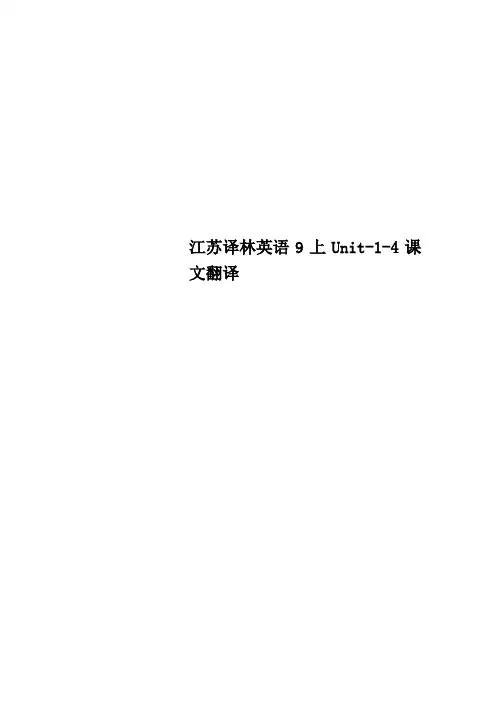
江苏译林英语9上Unit-1-4课文翻译9上Unit 1-4课文翻译姓名:_______________ ❖9AU1 Comic strip—埃迪,这是一篇有趣的关于性格的文章。
—哦?让我看看。
—它说有些人很慷慨。
他们感觉与其他人分享东西很好。
—对,我同意。
—我很慷慨。
—是的,你是。
—霍波,你把我的早餐吃光了 ! —但这会让你感觉很好啊!❖9AU1 Welcome to the Unit1.Suzy很有条理。
她把所有的东西都整理得井井有条。
2. Daniel很聪明,但他很谦虚且从不炫耀。
3. 吴老师足够耐心,为我们重复语法规则。
4. Samuel很有创造力。
他经常想到新主意。
5. Billy对一切都很好奇。
他喜欢问问题。
6. Simon很有活力。
他总是成小时地踢球。
米莉:我很有耐心,不轻易生气。
我认为我会是一名好老师或者一名好医生。
你呢,保罗?保罗:我有时候很粗心。
我父母和我都认为我不能做一名好会计,你喜欢什么工作,桑迪?桑迪:我的美木老师说我经常有令人兴奋的主意。
我喜欢创造性的工作。
你呢,戴维?戴维:我很活跃,我喜欢与人交谈。
对于我来说,整天工作而不说话很可怕。
❖9AU1 Reading吴维,艺术家:“吴维是一位天生的艺术家,”他最好的朋友说。
“他很安静,话不多,但是他的作品却极具说服力!”吴维——年轻的艺术家,他富有创造力的作品给全国留下了很深的印象。
他给阳光镇广场做的雕塑赢得了艺术协会的高度赞扬。
他说:“我想与人们分享最好的艺术,因此我总是搜索一些更好的或不同的东西。
这本身就是非常有趣的事。
”苏宁,经理:五年前,苏宁放弃了她的会计工作,并开始在一家大公司的销售部门工作。
“我活跃并且精力充沛,我喜欢和人们在一起工作。
然而,在我的上一份工作中,我只能日复一日地跟数字打交道。
那使我不开心。
”现在苏宁是这家公司的总经理。
她说:“人生就像一场赛跑。
你要么领先要么落后。
我随时准备好迎接新的挑战。
”刘浩,工程师:刘浩是阳光镇到天津这段高速公路的首席工程师。
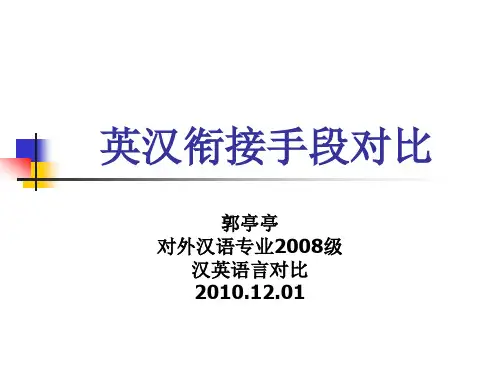
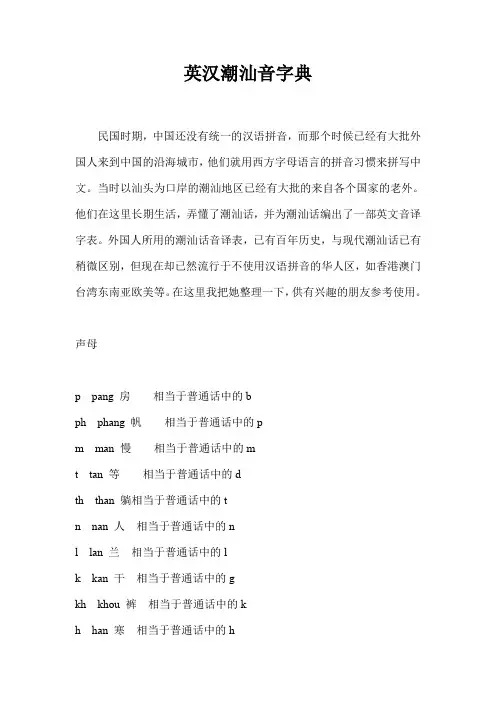
英汉潮汕音字典民国时期,中国还没有统一的汉语拼音,而那个时候已经有大批外国人来到中国的沿海城市,他们就用西方字母语言的拼音习惯来拼写中文。
当时以汕头为口岸的潮汕地区已经有大批的来自各个国家的老外。
他们在这里长期生活,弄懂了潮汕话,并为潮汕话编出了一部英文音译字表。
外国人所用的潮汕话音译表,已有百年历史,与现代潮汕话已有稍微区别,但现在却已然流行于不使用汉语拼音的华人区,如香港澳门台湾东南亚欧美等。
在这里我把她整理一下,供有兴趣的朋友参考使用。
声母p pang 房相当于普通话中的bph phang 帆相当于普通话中的pm man 慢相当于普通话中的mt tan 等相当于普通话中的dth than 躺相当于普通话中的tn nan 人相当于普通话中的nl lan 兰相当于普通话中的lk kan 干相当于普通话中的gkh khou 裤相当于普通话中的kh han 寒相当于普通话中的hg gou 吴普通话中没有这个音,但从例字中不难得出读音。
ch chan 赞相当于普通话中的zchh chhou 粗相当于普通话中的cs san 珊相当于普通话中的sj jan 然相当于普通话中的rb bi 米普通话中没有这个音,但从例字中不难得出读音。
ng ngi 宜普通话中没有这个音,但从例字中不难得出读音。
一般后带h的都标识清音,而不带的标识浊音,所以有p-ph,t-th,k-kh,ch-chh(此例比较特殊,主要应该是考虑到英语习惯)。
而m,n,l,h,s,j(r)是与普通话或世界音标一致的。
g,b,ng是潮汕话中特有的音,可以说分别是k,p,n(对应上表的)的鼻音话。
在这里,相比现代汉语拼音,无非就少了d,f,q,x,而这几个除了d(其实在这里就是t),q与x其实在国际音标中也是不作声母的,在实际应用中它们也被chh和s代替了,而f是潮语中唯一少了的常用声母。
所以很多潮汕人在发这个音时会觉得很困难。
在下面的韵母表中带h清化同样有效,但一般是在实际情况中才会结合情况与个人爱好用到。
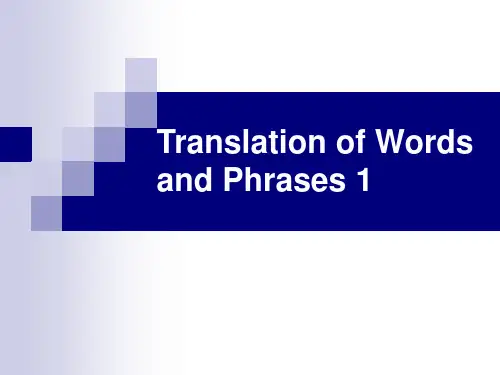
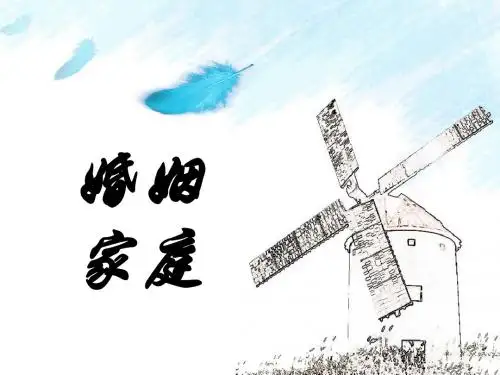
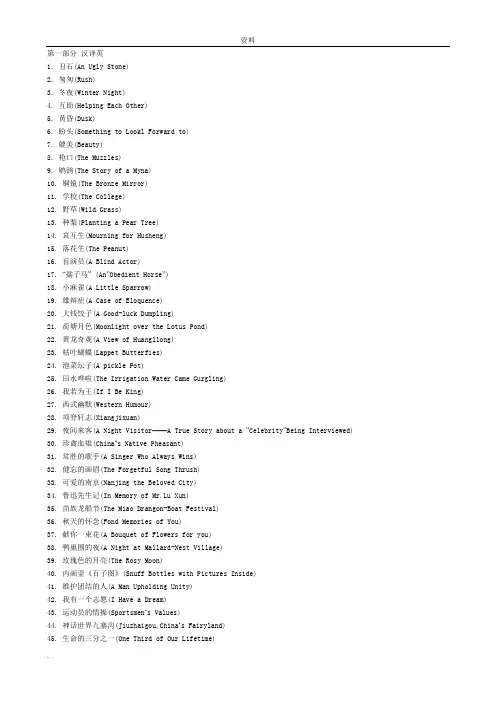
第一部分汉译英1. 丑石(An Ugly Stone)2. 匆匆(Rush)3. 冬夜(Winter Night)4. 互助(Helping Each Other)5. 黄昏(Dusk)6. 盼头(Something to Lookl Forward to)7. 媲美(Beauty)8. 枪口(The Muzzles)9. 鸲鹆(The Story of a Myna)10. 铜镜(The Bronze Mirror)11. 学校(The College)12. 野草(Wild Grass)13. 种梨(Planting a Pear Tree)14. 哀互生(Mourning for Husheng)15. 落花生(The Peanut)16. 盲演员(A Blind Actor)17. “孺子马” (An”Obedient Horse”)18. 小麻雀(A Little Sparrow)19. 雄辩症(A Case of Eloquence)20. 大钱饺子(A Good-luck Dumpling)21. 荷塘月色(Moonlight over the Lotus Pond)22. 黄龙奇观(A View of Huangllong)23. 枯叶蝴蝶(Lappet Butterfies)24. 泡菜坛子(A pickle Pot)25. 田水哗啦(The Irrigation Water Came Gurgling)26. 我若为王(If I Be King)27. 西式幽默(Western Humour)28. 项脊轩志(Xiangjixuan)29. 夜间来客(A Night Visitor——A True Story about a ”Celebrity”Being Interviewed)30. 珍禽血雉(China‘s Native Pheasant)31. 常胜的歌手(A Singer Who Always Wins)32. 健忘的画眉(The Forgetful Song Thrush)33. 可爱的南京(Nanjing the Beloved City)34. 鲁迅先生记(In Memory of Mr.Lu Xun)35. 苗族龙船节(The Miao Drangon-Boat Festival)36. 秋天的怀念(Fond Memories of You)37. 献你一束花(A Bouquet of Flowers for you)38. 鸭巢围的夜(A Night at Mallard-Nest Village)39. 玫瑰色的月亮(The Rosy Moon)40. 内画壶《百子图》(Snuff Bottles with Pictures Inside)41. 维护团结的人(A Man Upholding Unity)42. 我有一个志愿(I Have a Dream)43. 运动员的情操(Sportsmen‘s Values)44. 神话世界九寨沟(Jiuzhaigou,China‘s Fairyland)45. 生命的三分之一(One Third of Our Lifetime)46. 我可能是天津人(I Might Have Come from Tianjin)47. 五台名刹画沧桑(The famous Monastery Witnesses Vicissitudes)48. 爱梦想的羞怯女孩(A Shy Dreamer)49. 永久的憧憬和追求(My Lnging and yearning)50. 老人和他的三个儿子(The Old Man and his three sons)51. 乐山龙舟会多姿多彩(dragon-Boat Festival at Leshan)52. 撷自那片芳洲的清供(An Offering from his Sweet homeland)53. 三峡多奇景妙笔夺开工(The Scenic Three Gorges Captured )54. 初中国旅游可到哪些地方(Tips on Traveling to China the First Time)第二部分英译汉1. A Ball to Roll Around(滚球)2. A Boupquet for Miss Benson(送给卞老师的一束花)3. A Boy and His Father Become Partners(父子伙伴情)4. A Gift of Dreams(梦寐以求的礼物)5. A Hard Day in the Kitchen(厨房里的一场闹刷)6. A Nation of Hypochondriacs(一个疑病症患者的国度)7. Are Books an Endangered Species? (书籍是即将灭绝的物种吗?)8. A Sailor‘s Christmas Gift(一个海员的圣诞礼物)9. A Tale of Two Smut Merchants(两上淫秽照片商的故事)10. A Visit with the Folks(探访故亲)11. Canadian Eskimo Lithographs(加拿大爱斯基摩人的石版画)12. Divorce and Kids(离婚与孩子)13. Doug Heir(杜格·埃厄)14. Fame(声誉)15. Felicia‘s Journey(费利西娅的旅行)16. Genius Sacrificed for failure(为育庸才损英才)17. Glories of the Storm(辉煌壮丽的暴风雨)18. Han Suyin‘s China(韩素音笔下的中国)19. Hate(仇恨)20. How Should One Read a Book? (怎样读书?)21. In Praie of the Humble Comma(小小逗号赞)22. Integrity——From A Mother in Mannville(正直)23. In the Pursuit of a Haunting and Timeless Truth(追寻一段永世难忘的史实)24. Killer on Wings is Under Threat(飞翔的杀手正受到威胁)25. Life in a Violin Case(琴匣子中的生趣)26. Love Is Not like Merchandise(爱情不是商品)27. Luck(好运气)28. Mayhew(生活的道路)29. My Averae Uncle(艾默大叔——一个普普通通的人)30. My Father‘s Music(我父亲的音乐)31. My Mother‘s Gift (母亲的礼物)32. New Light Buld Offers Energy Efficiency(新型灯泡提高能效)33. Of Studies(谈读书)34. On Leadership(论领导)35. On Cottages in General(农舍概述)36. Over the Hill(开小差)37. Promise of Bluebirds(蓝知更鸟的希望)38. Stories on a Headboard(床头板上故事多)39. Sunday(星期天)40. The Blanket(一条毛毯)41. The Colour of the Sky(天空的色彩)42. The date Father Didn‘t Keep(父亲失约)43. The Kiss(吻)44. The Letter(家书)45. The Little Boat That Sailed through Time(悠悠岁月小船情)46. The Living Seas(富有生命的海洋)47. The Roots of My Ambition(我的自强之源)48. The song of the River(河之歌)49. They Wanted Him Everywhere——Herbert von Karajan(1908-1989) (哪儿都要他)50. Three Great Puffy Rolls(三个又大双暄的面包圈)51. Trust(信任)52. Why measure Life in Hearbeats? (何必以心跳定生死?)53. Why the bones Break(骨折缘何而起)54. Why Women Live Longer than Men(为什么女人经男人活得长)丑石贾平凹我常常遗憾我家门前的那块丑石呢:它黑黝黝地卧在那里,牛似的模样;谁也不知道是什么时候留在这里的.谁也不去理会它。
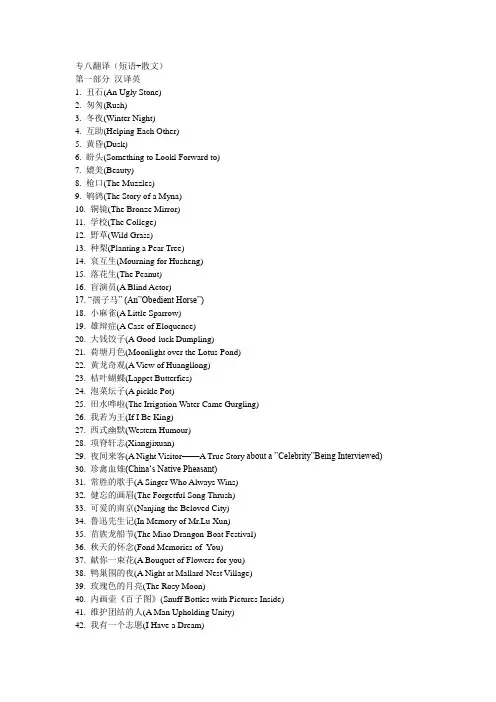
专八翻译(短语+散文)第一部分汉译英1. 丑石(An Ugly Stone)2. 匆匆(Rush)3. 冬夜(Winter Night)4. 互助(Helping Each Other)5. 黄昏(Dusk)6. 盼头(Something to Lookl Forward to)7. 媲美(Beauty)8. 枪口(The Muzzles)9. 鸲鹆(The Story of a Myna)10. 铜镜(The Bronze Mirror)11. 学校(The College)12. 野草(Wild Grass)13. 种梨(Planting a Pear Tree)14. 哀互生(Mourning for Husheng)15. 落花生(The Peanut)16. 盲演员(A Blind Actor)17. “孺子马” (An”Obedient Horse”)18. 小麻雀(A Little Sparrow)19. 雄辩症(A Case of Eloquence)20. 大钱饺子(A Good-luck Dumpling)21. 荷塘月色(Moonlight over the Lotus Pond)22. 黄龙奇观(A View of Huangllong)23. 枯叶蝴蝶(Lappet Butterfies)24. 泡菜坛子(A pickle Pot)25. 田水哗啦(The Irrigation Water Came Gurgling)26. 我若为王(If I Be King)27. 西式幽默(Western Humour)28. 项脊轩志(Xiangjixuan)29. 夜间来客(A Night Visitor——A True Story about a ”Celebrity”Being Interviewed)30. 珍禽血雉(China…s Native Pheasant)31. 常胜的歌手(A Singer Who Always Wins)32. 健忘的画眉(The Forgetful Song Thrush)33. 可爱的南京(Nanjing the Beloved City)34. 鲁迅先生记(In Memory of Mr.Lu Xun)35. 苗族龙船节(The Miao Drangon-Boat Festival)36. 秋天的怀念(Fond Memories of You)37. 献你一束花(A Bouquet of Flowers for you)38. 鸭巢围的夜(A Night at Mallard-Nest Village)39. 玫瑰色的月亮(The Rosy Moon)40. 内画壶《百子图》(Snuff Bottles with Pictures Inside)41. 维护团结的人(A Man Upholding Unity)42. 我有一个志愿(I Have a Dream)43. 运动员的情操(Sportsmen…s Values)44. 神话世界九寨沟(Jiuzhaigou,China…s Fairyland)45. 生命的三分之一(One Third of Our Lifetime)46. 我可能是天津人(I Might Have Come from Tianjin)47. 五台名刹画沧桑(The famous Monastery Witnesses Vicissitudes)48. 爱梦想的羞怯女孩(A Shy Dreamer)49. 永久的憧憬和追求(My Lnging and yearning)50. 老人和他的三个儿子(The Old Man and his three sons)51. 乐山龙舟会多姿多彩(dragon-Boat Festival at Leshan)52. 撷自那片芳洲的清供(An Offering from his Sweet homeland)53. 三峡多奇景妙笔夺开工(The Scenic Three Gorges Captured )54. 初中国旅游可到哪些地方(Tips on Traveling to China the First Time)第二部分英译汉1. A Ball to Roll Around(滚球)2. A Boupquet for Miss Benson(送给卞老师的一束花)3. A Boy and His Father Become Partners(父子伙伴情)4. A Gift of Dreams(梦寐以求的礼物)5. A Hard Day in the Kitchen(厨房里的一场闹刷)6. A Nation of Hypochondriacs(一个疑病症患者的国度)7. Are Books an Endangered Species? (书籍是即将灭绝的物种吗?)8. A Sailor…s Christmas Gift(一个海员的圣诞礼物)9. A Tale of Two Smut Merchants(两上淫秽照片商的故事)10. A Visit with the Folks(探访故亲)11. Canadian Eskimo Lithographs(加拿大爱斯基摩人的石版画)12. Divorce and Kids(离婚与孩子)13. Doug Heir(杜格·埃厄)14. Fame(声誉)15. Felicia…s Journey(费利西娅的旅行)16. Genius Sacrificed for failure(为育庸才损英才)17. Glories of the Storm(辉煌壮丽的暴风雨)18. Han Suyin…s China(韩素音笔下的中国)19. Hate(仇恨)20. How Should One Read a Book? (怎样读书?)21. In Praie of the Humble Comma(小小逗号赞)22. Integrity——From A Mother in Mannville(正直)23. In the Pursuit of a Haunting and Timeless Truth(追寻一段永世难忘的史实)24. Killer on Wings is Under Threat(飞翔的杀手正受到威胁)25. Life in a Violin Case(琴匣子中的生趣)26. Love Is Not like Merchandise(爱情不是商品)27. Luck(好运气)28. Mayhew(生活的道路)29. My Averae Uncle(艾默大叔——一个普普通通的人)30. My Father…s Music(我父亲的音乐)31. My Mother…s Gift (母亲的礼物)32. New Light Buld Offers Energy Efficiency(新型灯泡提高能效)33. Of Studies(谈读书)34. On Leadership(论领导)35. On Cottages in General(农舍概述)36. Over the Hill(开小差)37. Promise of Bluebirds(蓝知更鸟的希望)38. Stories on a Headboard(床头板上故事多)39. Sunday(星期天)40. The Blanket(一条毛毯)41. The Colour of the Sky(天空的色彩)42. The date Father Didn…t Keep(父亲失约)43. The Kiss(吻)44. The Letter(家书)45. The Little Boat That Sailed through Time(悠悠岁月小船情)46. The Living Seas(富有生命的海洋)47. The Roots of My Ambition(我的自强之源)48. The song of the River(河之歌)49. They Wanted Him Everywhere ——Herbert von Karajan(1908-1989) (哪儿都要他)50. Three Great Puffy Rolls(三个又大双暄的面包圈)51. Trust(信任)52. Why measure Life in Hearbeats? (何必以心跳定生死?)53. Why the bones Break(骨折缘何而起)54. Why Women Live Longer than Men(为什么女人经男人活得长)丑石贾平凹我常常遗憾我家门前的那块丑石呢:它黑黝黝地卧在那里,牛似的模样;谁也不知道是什么时候留在这里的.谁也不去理会它。
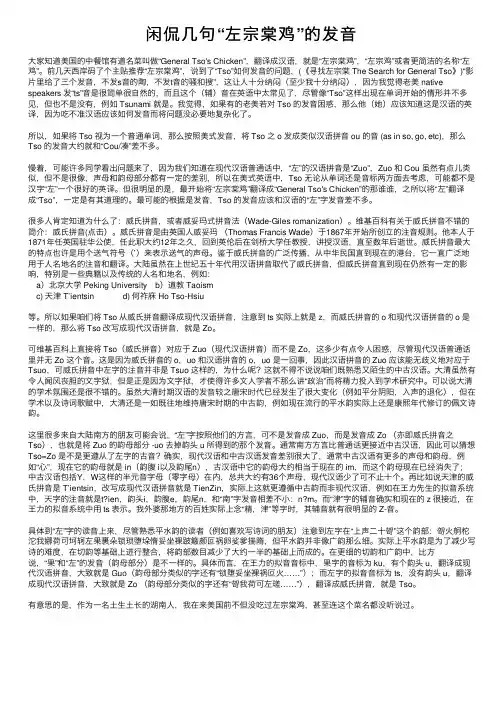
闲侃⼏句“左宗棠鸡”的发⾳⼤家知道美国的中餐馆有道名菜叫做“General Tso's Chicken”,翻译成汉语,就是“左宗棠鸡”,“左宗鸡”或者更简洁的名称“左鸡”。
前⼏天西岸码了个主贴推荐“左宗棠鸡”,说到了“Tso”如何发⾳的问题,(《寻找左宗棠 The Search for General Tso》)“影⽚⾥给了三个发⾳,不发s⾳的陶,不发t⾳的骚和搜”,这让⼈⼗分纳闷(⾄少我⼗分纳闷),因为我觉得⽼美 native speakers 发“ts”⾳是很简单很⾃然的,⽽且这个(辅)⾳在英语中太常见了,尽管像“Tso”这样出现在单词开始的情形并不多见,但也不是没有,例如 Tsunami 就是。
我觉得,如果有的⽼美若对 Tso 的发⾳困惑,那么他(她)应该知道这是汉语的英译,因为吃不准汉语应该如何发⾳⽽将问题没必要地复杂化了。
所以,如果将 Tso 视为⼀个普通单词,那么按照美式发⾳,将 Tso 之 o 发成类似汉语拼⾳ ou 的⾳ (as in so, go, etc),那么Tso 的发⾳⼤约就和“Cou/凑”差不多。
慢着,可能许多同学看出问题来了,因为我们知道在现代汉语普通话中,“左”的汉语拼⾳是“Zuo”,Zuo 和 Cou 虽然有点⼉类似,但不是很像,声母和韵母部分都有⼀定的差别,所以在美式英语中,Tso ⽆论从单词还是⾳标两⽅⾯去考虑,可能都不是汉字“左”⼀个很好的英译。
但很明显的是,最开始将“左宗棠鸡”翻译成“General Tso's Chicken”的那谁谁,之所以将“左”翻译成“Tso”,⼀定是有其道理的。
最可能的根据是发⾳,Tso 的发⾳应该和汉语的“左”字发⾳差不多。
很多⼈肯定知道为什么了:威⽒拼⾳,或者威妥玛式拼⾳法(Wade-Giles romanization)。
维基百科有关于威⽒拼⾳不错的简介:威⽒拼⾳(点击)。
威⽒拼⾳是由英国⼈威妥玛(Thomas Francis Wade)于1867年开始所创⽴的注⾳规则。
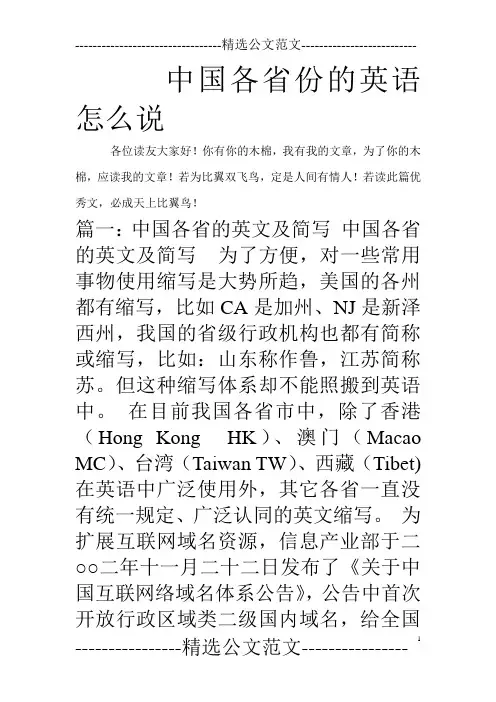
中国各省份的英语怎么说各位读友大家好!你有你的木棉,我有我的文章,为了你的木棉,应读我的文章!若为比翼双飞鸟,定是人间有情人!若读此篇优秀文,必成天上比翼鸟!篇一:中国各省的英文及简写中国各省的英文及简写为了方便,对一些常用事物使用缩写是大势所趋,美国的各州都有缩写,比如CA是加州、NJ是新泽西州,我国的省级行政机构也都有简称或缩写,比如:山东称作鲁,江苏简称苏。
但这种缩写体系却不能照搬到英语中。
在目前我国各省市中,除了香港(Hong Kong HK)、澳门(Macao MC)、台湾(Taiwan TW)、西藏(Tibet)在英语中广泛使用外,其它各省一直没有统一规定、广泛认同的英文缩写。
为扩展互联网域名资源,信息产业部于二○○二年十一月二十二日发布了《关于中国互联网络域名体系公告》,公告中首次开放行政区域类二级国内域名,给全国34个省(市、自治区、特别行政区)规定了二个字母的代码;笔者认为,随着互联网的深入发展,该代码将自然而然地成为各省区的缩写名称,可以放心使用;信息产业部采用的代码与英译名缩写基本上吻合,只有内蒙古(英译:Inner Mongolia, 缩写:IM,而信息部的代码是利用了纯汉语拼音,为NM)、西藏(英译:Tibet, 而二级域名使用的仍是汉语拼音XZ)两个词出现不协调现象,但这并不影响该缩写系统的推广。
基于以上考虑,笔者推荐各省级行政区域对应英文缩写如下:省份英译缩写安徽Anhui AH 北京Beijing BJ 福建Fujian FJ 甘肃Gansu GS 广东Guangdong GD 广西Guangxi GX 贵州Guizhou GZ 海南Hainan HI 河北Hebei HE 河南Henan HA 黑龙江Heilongjiang HL 湖北Hubei HB 湖南Hunan HN 吉林Jilin JL 江苏Jiangsu JS 江西Jiangxi JX 辽宁Liaoning LN 内蒙古自治区Inner Mongoria IM(NM)宁夏NingxiaNX 青海Qinghai QH 山东Shandong SD 山西Shanxi SX 陕西Shaanxi SN 上海Shanghai SH四川Sichuan SC 天津Tianjing TJ 西藏Tibet XZ 新疆Xinjiang XJ 云南Yunnan YN 浙江Zhejiang ZJ 重庆Chongqing CQ 澳门Macao MO 香港Hong Kong HK 台湾Taiwan TW 注:一般采用汉语拼音首字母组合形式,但其中山西(Shanxi)和陕西(Shaanxi), 湖北(Hubei)和河北(Hebei),湖南(Hunan)、河南(Henan)和海南(Hainan)按这种方法会发生冲突,采取了变通手段,兹对比如下:山西ShanxiSX 陕西Shaanxi SN 湖北Hubei HB 河北HebeiHE 湖南HunanHN 河南HenanHA 海南Hainan HI 在上述变化中,湖北和湖南两省遵循旧规则,河北和河南两省后退一个字母进行组合。
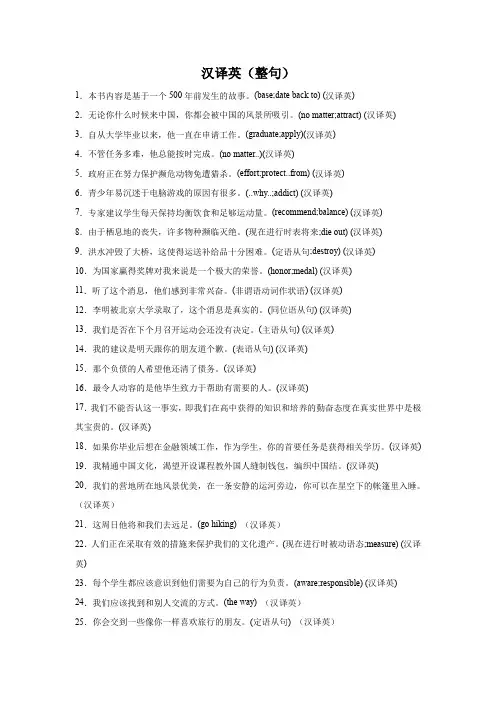
汉译英(整句)1.本书内容是基于一个500年前发生的故事。
(base;date back to) (汉译英)2.无论你什么时候来中国,你都会被中国的风景所吸引。
(no matter;attract) (汉译英)3.自从大学毕业以来,他一直在申请工作。
(graduate;apply)(汉译英)4.不管任务多难,他总能按时完成。
(no matter..)(汉译英)5.政府正在努力保护濒危动物免遭猎杀。
(effort;protect..from) (汉译英)6.青少年易沉迷于电脑游戏的原因有很多。
(..why..;addict) (汉译英)7.专家建议学生每天保持均衡饮食和足够运动量。
(recommend;balance) (汉译英)8.由于栖息地的丧失,许多物种濒临灭绝。
(现在进行时表将来;die out) (汉译英)9.洪水冲毁了大桥,这使得运送补给品十分困难。
(定语从句;destroy) (汉译英)10.为国家赢得奖牌对我来说是一个极大的荣誉。
(honor;medal) (汉译英)11.听了这个消息,他们感到非常兴奋。
(非谓语动词作状语) (汉译英)12.李明被北京大学录取了,这个消息是真实的。
(同位语从句) (汉译英)13.我们是否在下个月召开运动会还没有决定。
(主语从句) (汉译英)14.我的建议是明天跟你的朋友道个歉。
(表语从句) (汉译英)15.那个负债的人希望他还清了债务。
(汉译英)16.最令人动容的是他毕生致力于帮助有需要的人。
(汉译英)17.我们不能否认这一事实,即我们在高中获得的知识和培养的勤奋态度在真实世界中是极其宝贵的。
(汉译英)18.如果你毕业后想在金融领域工作,作为学生,你的首要任务是获得相关学历。
(汉译英) 19.我精通中国文化,渴望开设课程教外国人缝制钱包,编织中国结。
(汉译英)20.我们的营地所在地风景优美,在一条安静的运河旁边,你可以在星空下的帐篷里入睡。
(汉译英)21.这周日他将和我们去远足。
【专八来了】翻译欣赏第一部分汉译英1. 丑石(An Ugly Stone)2. 匆匆(Rush)3. 冬夜(Winter Night)4. 互助(Helping Each Other)5. 黄昏(Dusk)6. 盼头(Something to Lookl Forward to)7. 媲美(Beauty)8. 枪口(The Muzzles)9. 鸲鹆(The Story of a Myna)10. 铜镜(The Bronze Mirror)11. 学校(The College)12. 野草(Wild Grass)13. 种梨(Planting a Pear Tree)14. 哀互生(Mourning for Husheng)15. 落花生(The Peanut)16. 盲演员(A Blind Actor)17. “孺子马” (An”Obedient Horse”)18. 小麻雀(A Little Sparrow)19. 雄辩症(A Case of Eloquence)20. 大钱饺子(A Good-luck Dumpling)21. 荷塘月色(Moonlight over the Lotus Pond)22. 黄龙奇观(A View of Huangllong)23. 枯叶蝴蝶(Lappet Butterfies)24. 泡菜坛子(A pickle Pot)25. 田水哗啦(The Irrigation Water Came Gurgling)26. 我若为王(If I Be King)27. 西式幽默(Western Humour)28. 项脊轩志(Xiangjixuan)29. 夜间来客(A Night Visitor——A True Stor y about a ”Celebrity”Being Interviewed)30. 珍禽血雉(China…s Native Pheasant)31. 常胜的歌手(A Singer Who Always Wins)32. 健忘的画眉(The Forgetful Song Thrush)33. 可爱的南京(Nanjing the Beloved City)34. 鲁迅先生记(In Memory of Mr.Lu Xun)35. 苗族龙船节(The Miao Drangon-Boat Festival)36. 秋天的怀念(Fond Memories of You)37. 献你一束花(A Bouquet of Flowers for you)38. 鸭巢围的夜(A Night at Mallard-Nest Village)39. 玫瑰色的月亮(The Rosy Moon)40. 内画壶《百子图》(Snuff Bottles with Pictures Inside)41. 维护团结的人(A Man Upholding Unity)42. 我有一个志愿(I Have a Dream)43. 运动员的情操(Sportsmen…s Values)44. 神话世界九寨沟(Jiuzhaigou,China…s Fairyland)45. 生命的三分之一(One Third of Our Lifetime)46. 我可能是天津人(I Might Have Come from Tianjin)47. 五台名刹画沧桑(The famous Monastery Witnesses Vicissitudes)48. 爱梦想的羞怯女孩(A Shy Dreamer)49. 永久的憧憬和追求(My Lnging and yearning)50. 老人和他的三个儿子(The Old Man and his three sons)51. 乐山龙舟会多姿多彩(dragon-Boat Festival at Leshan)52. 撷自那片芳洲的清供(An Offering from his Sweet homeland)53. 三峡多奇景妙笔夺开工(The Scenic Three Gorges Captured )54. 初中国旅游可到哪些地方(Tips on Traveling to China the First Time)第二部分英译汉1. A Ball to Roll Around(滚球)2. A Boupquet for Miss Benson(送给卞老师的一束花)3. A Boy and His Father Become Partners(父子伙伴情)4. A Gift of Dreams(梦寐以求的礼物)5. A Hard Day in the Kitchen(厨房里的一场闹刷)6. A Nation of Hypochondriacs(一个疑病症患者的国度)7. Are Books an Endangered Species? (书籍是即将灭绝的物种吗?)8. A Sailor…s Christmas Gift(一个海员的圣诞礼物)9. A Tale of Two Smut Merchants(两上淫秽照片商的故事)10. A Visit with the Folks(探访故亲)11. Canadian Eskimo Lithographs(加拿大爱斯基摩人的石版画)12. Divorce and Kids(离婚与孩子)13. Doug Heir(杜格·埃厄)14. Fame(声誉)15. Felicia…s Journey(费利西娅的旅行)16. Genius Sacrificed for failure(为育庸才损英才)17. Glories of the Storm(辉煌壮丽的暴风雨)18. Han Suyin…s China(韩素音笔下的中国)19. Hate(仇恨)20. How Should One Read a Book? (怎样读书?)21. In Praie of the Humble Comma(小小逗号赞)22. Integrity——From A Mother in Mannville(正直)23. In the Pursuit of a Haunting and Timeless Truth(追寻一段永世难忘的史实)24. Killer on Wings is Under Threat(飞翔的杀手正受到威胁)25. Life in a Violin Case(琴匣子中的生趣)26. Love Is Not like Merchandise(爱情不是商品)27. Luck(好运气)28. Mayhew(生活的道路)29. My Averae Uncle(艾默大叔——一个普普通通的人)30. My Father…s Music(我父亲的音乐)31. My Mother…s Gift (母亲的礼物)32. New Light Buld Offers Energy Efficiency(新型灯泡提高能效)33. Of Studies(谈读书)34. On Leadership(论领导)35. On Cottages in General(农舍概述)36. Over the Hill(开小差)37. Promise of Bluebirds(蓝知更鸟的希望)38. Stories on a Headboard(床头板上故事多)39. Sunday(星期天)40. The Blanket(一条毛毯)41. The Colour of the Sky(天空的色彩)42. The date Father Didn…t Keep(父亲失约)43. The Kiss(吻)44. The Letter(家书)45. The Little Boat That Sailed through Time(悠悠岁月小船情)46. The Living Seas(富有生命的海洋)47. The Roots of My Ambition(我的自强之源)48. The song of the River(河之歌)49. They Wanted Him Everywhere——Herbert von Karajan(1908-1989) (哪儿都要他)50. Three Great Puffy Rolls(三个又大双暄的面包圈)51. Trust(信任)52. Why measure Life in Hearbeats? (何必以心跳定生死?)53. Why the bones Break(骨折缘何而起)54. Why Women Live Longer than Men(为什么女人经男人活得长)【专八来了】翻译常用四字词语预防为主prevention first综合治理comprehensive control/management全面推进entire/all-round push-on重点突破breakthrough at key points亲仁善邻cordiality, benevolence and good neighborliness和睦相处living in harmony with others强不凌弱,富不侮贫The strong should not oppress the weak and the rich shou ld not bully the poor.协和万邦All nations live side by side in perfect harmony.海纳百川,有容乃大One should be as inclusive as the ocean, which is vast bec ause it admits hundreds of rivers.兼收并蓄embrace everything that is useful光阴似箭Time flies like an arrow. /How time files!有诺必践Commitment should always be kept.一如既往unswervingly和衷共济solidarity; fighting together with one accord亡国灭种extinction; being conquered and destroyed万众一心pull together; join hands; make joint efforts; be united as one浩然气概noble spirit不屈节操unyielding moral principle赴汤蹈火go through fire and water殊死奋战fight desperately; fight to death可歌可泣moved one to songs and tears英勇卓绝heroic and splendid插科打诨comic parts精微深奥profound and abstruse博大精深extensive and profound源远流长run a long history天下为公The world belongs to all the people.天下兴亡,匹夫有责Every man has a duty to his country. 吃苦耐劳hard work and enduring hardship勤俭持家run the household industriously and frugally跨文化翻译应该了解的~~中国古代官职(一品~五品)中英对照一品丞相the Prime Minister相国the Premier大司马Great Minister of War大将军Great General大都督Commander in Chief太尉Grand Commandant太傅Grand Preceptor大司空Great Minister of Public Works大司徒the Chief Minister of the Interior二品骠骑将军General of the Flying Cavalry车骑将军General of Chariots and Cavalry镇东大将军Great General Who Guards the East镇南大将军Great General Who Guards the South镇西大将军Great General Who Guards the West镇北大将军Great General Who Guards the North征东大将军Great General Who Assails the East征南大将军Great General Who Assails the South征西大将军Great General Who Assails the West征北大将军Great General Who Assails the North光禄大夫Imperial Minister of State卫将军General of Martial Might中军大将军Great General of the Central Army上军大将军Great General of the Upper Army三品光禄勋Chief of Palace Administration太常Master of Ceremony尚书令Chief of Secretariat执金吾Chief of the Capital Guard安东将军General Who Stabilizes the East安南将军General Who Stabilizes the South安西将军General Who Stabilizes the West安北将军General Who Stabilizes the North平北将军General Who Pacifies the North平东将军General Who Pacifies the East平南将军General Who Pacifies the South平西将军General Who Pacifies the West前将军General of the Forward Army后将军General of the Rear左将军General of the Left右将军General of the Right中领军Commandant of the Central Army四品御史中丞Imperial Minister中坚将军General Who is the Core of the Army骁骑将军General of Valiant Cavalry游击将军General of Guerrilla Warfare积弩将军General in Charge of the Production of Crossbows积射将军General in Charge of the Production of Bows城门校尉Commander Who Guards Gate典军中郎将Chief Imperial Corps Commander积弩都尉Commandant in Charge of the Production of Crossbows 持节都尉Commandant Who Holds Tallies副军中郎将Deputy Imperial Corps Commander典铠都尉Commandant in Charge of Amors抚军中郎将Imperial Corps Commander Who Uplifts the Army武卫中郎将Imperial Corps Commander of the Military Guard五品符节令Officer in Charge of Tallies鹰扬将军General Who Displays Owl‟s Might折冲将军General Who Oppresses the Enemy with Ferocity伏波将军General Who Overcomes Adversity破虏将军General Who Eliminates Barbarians横海将军General Who Crosses the Ocean楼船将军General in Charge of Navy复土将军General Who Restores Territory牙门将军Garrison Commander偏将军Assistant General 裨将军Deputy General。
中国优秀散文英译第一部分汉译英1. 丑石(An Ugly Stone)2. 匆匆(Rush)3. 冬夜(Winter Night)4. 互助(Helping Each Other)5. 黄昏(Dusk)6. 盼头(Something to Lookl Forward to)7. 媲美(Beauty)8. 枪口(The Muzzles)9. 鸲鹆(The Story of a Myna)10. 铜镜(The Bronze Mirror)11. 学校(The College)12. 野草(Wild Grass)13. 种梨(Planting a Pear Tree)14. 哀互生(Mourning for Husheng)15. 落花生(The Peanut)16. 盲演员(A Blind Actor)17. “孺子马” (An”Obedient Horse”)18. 小麻雀(A Little Sparrow)19. 雄辩症(A Case of Eloquence)20. 大钱饺子(A Good-luck Dumpling)21. 荷塘月色(Moonlight over the Lotus Pond)22. 黄龙奇观(A View of Huangllong)23. 枯叶蝴蝶(Lappet Butterfies)24. 泡菜坛子(A pickle Pot)25. 田水哗啦(The Irrigation Water Came Gurgling)26. 我若为王(If I Be King)27. 西式幽默(Western Humour)28. 项脊轩志(Xiangjixuan)29. 夜间来客(A Night Visitor——A True Story a bout a ”Celebrity”Being Interviewed)30. 珍禽血雉(China‘s Native Pheasant)31. 常胜的歌手(A Singer Who Always Wins)32. 健忘的画眉(The Forgetful Song Thrush)33. 可爱的南京(Nanjing the Beloved City)34. 鲁迅先生记(In Memory of Mr.Lu Xun)35. 苗族龙船节(The Miao Drangon-Boat Festival)36. 秋天的怀念(Fond Memories of You)37. 献你一束花(A Bouquet of Flowers for you)38. 鸭巢围的夜(A Night at Mallard-Nest Village)39. 玫瑰色的月亮(The Rosy Moon)40. 内画壶《百子图》(Snuff Bottles with Pictures Inside)41. 维护团结的人(A Man Upholding Unity)42. 我有一个志愿(I Have a Dream)43. 运动员的情操(Sportsmen‘s Values)44. 神话世界九寨沟(Jiuzhaigou,China‘s Fairyland)45. 生命的三分之一(One Third of Our Lifetime)46. 我可能是天津人(I Might Have Come from Tianjin)47. 五台名刹画沧桑(The famous Monastery Witnesses Vicissitudes)48. 爱梦想的羞怯女孩(A Shy Dreamer)49. 永久的憧憬和追求(My Lnging and yearning)50. 老人和他的三个儿子(The Old Man and his three sons)51. 乐山龙舟会多姿多彩(dragon-Boat Festival at Leshan)52. 撷自那片芳洲的清供(An Offering from his Sweet homeland)53. 三峡多奇景妙笔夺开工(The Scenic Three Gorges Captured )54. 初中国旅游可到哪些地方(Tips on Traveling to China the First Time)丑石贾平凹我常常遗憾我家门前的那块丑石呢:它黑黝黝地卧在那里,牛似的模样;谁也不知道是什么时候留在这里的.谁也不去理会它。
苏教译林版九年级英语下册第四单元Unit4 Life on Mars 课文翻译及知识点详解一、单词:Mars /mɑz / *火星helmet /’helmt / *头盔air tank /e tæk / *氧气罐dried food /drad fud / 干粮power pack /’pa pæk / *电源包sleeping bag /’slip bæg / 睡袋gravity /’grævt / *重力planet /’plænt / 行星crowded /’kradd / *拥挤的polluted /p’ljutd / 被污染的increase /’ræpd / 快地,迅速地rapid /n’kris / 增加(all) over again /l ‘v ‘gen\ ‘gen /再;重新passenger /’pæsnd / 乘客at a/the speed of /æt \ð spid v / 以……的速度unfortable /n’kmf()tb()l / 使人不舒服的,不舒适的oxygen /’ksd()n / *氧气in the form of /n ð fm v / 以……的形式tasty /’test / 味道好的specially /’spel / 专门的,特地float /flt / *飘浮;漂浮pare /km’pe / 比较pare to/with /km’pe tu wð / 与……相比interplanetary /nt’plænt()r / *行星间的network /’netwk / *网络challenging /’tæln(d) / *挑战性的rapidly /’ræpdl / 快地,迅速地aware /’we / *知道,意识到circle /’sk()l / 围绕;将……圈起来agreement /’grim()nt / 一致,同意distance /’dst()ns / *距离;远处possibility /,ps’blt / 可能性alien /’eln / *外星人stranger /’stren(d) / 外来者,陌生人carry out /’kær at / 开展;执行percentage /p’sentd / *百分率;百分数disadvantage /dsd’vɑntd / *劣势,缺点,不利条件risk /rsk / 风险,危险after all /’ɑft l /毕竟goods /ɡdz / *(复)商品,货品electronic /lek’trnk / 电子的entertainment /ent’tenm()nt / *娱乐九年级英语下Unit4单词.mp3点击上方►收听单词发音二、课文翻译:Comic strip1.-Wow,I’ve never thought about travelling into space.哇,我从未想过到太空旅行。
来自天津市的自我介绍英语Hello everyone, I'm from Tianjin, a vibrant city in China known for its rich history and modern charm. Growing up here, I've been surrounded by a blend of traditional culture and contemporary life.My hometown boasts the iconic Haihe River, where the old and new meet, mirroring my own interests in both the past and the present. I'm a lover of the arts, with a particular fondness for the Tianjin opera, which is as lively and colorful as our city itself.Education has always been a priority in my life. Tianjin is home to many prestigious schools and universities, andI've been fortunate to receive a well-rounded education that has nurtured my curiosity and critical thinking skills.In my free time, I enjoy exploring the city's diverse neighborhoods, each with its own unique flavor. From the bustling streets of Heping District to the serene parks, there's always something new to discover.Food is a significant part of my life, and Tianjin's cuisine is a testament to its culinary heritage. I relish the flavors of our local dishes, like the famous Goubuli stuffed buns, which are as delicious as they are symbolic of ourcity's warmth and hospitality.I'm also passionate about sports, and Tianjin's sports culture is thriving. Whether it's watching a football match at the Tianjin Olympic Center or playing basketball with friends, sports have taught me the values of teamwork and perseverance.As I look to the future, I'm excited about the opportunities that lie ahead. Tianjin's rapid development offers a wealth of possibilities, and I'm eager to contribute to its growth and success.In conclusion, I'm proud to be from Tianjin, a city that is as dynamic and welcoming as the people who call it home. I look forward to sharing more about my experiences and aspirations with you all.。
分享一百个天津话-整理版。
省的以后老问我。
<处贴>来源:陈汉卿的日志1.二八八这可是经典的天津话了,意指一般水平或中等偏下的,大概和“二把刀”差不多。
例:那么窄的道,也就您这老司机能过去,要换个二八八的,准卡那。
(另:“卡”字在天津读作qi a二声或三声)2.干嘛(ma四声)这也是经典的天津话了,译为:干什么呢3.倍儿(be四声)标准的天津话,就是指”特别的”意思.天津人基本上说话都带”倍儿”.例:介件褂子倍儿好看, 介螃海(轻声)倍儿香4.哏儿(ge二声)常和倍儿连用,”倍儿哏儿”指:特别好玩的意思5.腻味(ni四声wei一声)口头语:指讨厌人.例:你介么大的人了,恁么还这么腻味人呢!6.耐人(nai四声)译为:这人让人喜欢。
通常天津人说:我爱你,也会说为:我耐你。
7.受累敬语,译为麻烦。
例:受累您让我过去。
(貌似JIN来天津时也和FAN说过这话,被外地的FAN听成了“兽类”)8.色在天津有两种叫法:一,筛shai(三声)儿,连音;二,赛sai(三声)。
例:1.这是嘛色(筛儿)?2.色(赛,三声)盲。
9.掰掰(bai一声)天津人对“叔叔”的叫法。
同样,“伯伯”叫“大大”。
“伯母”叫“娘娘”。
要说明的是,天津对亲戚年龄的排序与很多地方相反,最小的要叫“老”,比如我同学hx总说她小姨怎么怎么,这要是到了天津,就叫“老姨”。
10.快kuai(三声)主要有两种意思:一,挠;二,舀。
例:1.我这后背好像让蚊子给咬了,帮我快(三声)快(三声)。
2.上水缸里快(三声)点儿水。
(另:天津话爱把“去”或“到”说成“上”)11.yong用、永、勇、泳、庸、涌……凡是读作yong音的,天津话都是rong,声母变,声调不变。
例:冗远(永远)。
12.顺shun(二声)难看、丢人、不好的意思,形容词。
例:你说他当着那么多人数落我,我多顺(二声)呐!另:垮kua(三声)顺(二声)的近义词,特指颜色对比过于鲜明或颜色太艳。
xx各省的英文简写和区域划分为了方便,对一些常用事物使用缩写是大势所趋,美国的各州都有缩写,比如CA是加州、NJ是新泽西州,我国的省级行政机构也都有简称或缩写,比如:山东称作鲁,江苏简称苏。
但这种缩写体系却不能照搬到英语中。
在目前我国各省市中,除了香港(Hong Kong HK)、澳门(Macao MC)、台湾(Taiwan TW)、西藏(Tibet)在英语中广泛使用外,其它各省一直没有统一规定、广泛认同的英文缩写。
笔者注意到,为扩展互联网域名资源,信息产业部于二○○二年十一月二十二日发布了《关于中国互联网络域名体系公告》,公告中首次开放行政区域类二级国内域名,给全国34个省(市、自治区、特别行政区)规定了二个字母的代码;笔者认为,随着互联网的深入发展,该代码将自然而然地成为各省区的缩写名称,可以放心使用;信息产业部采用的代码与英译名缩写基本上吻合,只有内蒙古(英译:Inner Mongolia, 缩写:IM,而信息部的代码是利用了纯汉语拼音,为NM)、西藏(英译:Tibet, 而二级域名使用的仍是汉语拼音XZ)两个词出现不协调现象,但这并不影响该缩写系统的推广。
基于以上考虑,笔者推荐各省级行政区域对应英文缩写如下:省份英译缩写安徽Anhui AH北京Beijing BJ福建Fujian FJ甘肃Gansu GS广东Guangdong GD广西Guangxi GX贵州Guizhou GZ河北Hebei HE河南Henan HA黑龙江Heilongjiang HL湖北Hubei HB湖南Hunan HN吉林Jilin JL江苏Jiangsu JS江西Jiangxi JX辽宁Liaoning LN内蒙古自治区Inner Mongoria IM(NM)宁夏Ningxia NX青海Qinghai QH山东Shandong SD山西Shanxi SX陕西Shaanxi SN上海Shanghai SH四川Sichuan SC天津Tianjing TJ西藏Tibet XZ新疆Xinjiang XJ浙江Zhejiang ZJ重庆Chongqing CQ澳门Macao MO香港Hong Kong HK台湾Taiwan TW注:一般采用汉语拼音首字母组合形式,但其中山西(Shanxi)和陕西(Shaanxi), 湖北(Hubei)和河北(Hebei),湖南(Hunan)、河南(Henan)和海南(Hainan)按这种方法会发生冲突,采取了变通手段,兹对比如下:山西Shanxi SX陕西Shaanxi SN湖北Hubei HB河北Hebei HE湖南Hunan HN河南Henan HA海南Hainan HI在上述变化中,湖北和湖南两省遵循旧规则,河北和河南两省后退一个字母进行组合。